merc67/iStock/GettyImages
Whether you pasteurize the vegetables you pickle at home depends on how soon you want to eat them and what your recipe calls for. What kind of food you plan to pickle doesn't matter, any crisp vegetable or fruit will do, from asparagus to green beans, carrots and cauliflower to watermelon rinds. What does matter is either eating the tangy pickles soon after you make them or choosing to use proper pasteurization or canning methods to preserve them for up to one year stored in a cool, dark location..
What is Pasteurization?
Simply put, pasteurization is the process of either heating foods (or using gamma rays) to kill harmful foodborne bacteria that can make you sick. Sometimes very high heat is used for a short period of time, called flash pasteurization, such as for juices or juice boxes. Milk, on the other hand, is pasteurized at a low temperature for a long time. Some pickling recipes are able to use a low-temperature pasteurization process.
When to Pasteurize
If your recipe allows low-temperature pasteurization, typically with the jars submerged in water at 180 degrees Fahrenheit for 30 minutes, follow those directions exactly. Temperature must be maintained throughout the processing. After you finish the low-temp pasteurization, the pickles stay safe stored unopened in your pantry for up to one year.
When You Can Skip Pasteurization
Refrigerator or quick pickles are not preserved, lasting only about 10 days, but they are tangy and crunchy after a minimum of one hour in the fridge. To make quick pickled vegetables, cut the veggies into spears, sticks or smallish pieces, cover them completely with a salty, acidic brine made from vinegar, salt, sugar and spices, and let them soak. The longer they soak, the more flavorful they become. The pickles keep their crunch and are safe to eat for up to 10 days.
When Pickles Are Unsafe
Although there's little chance of quick pickles going bad within 10 days in the fridge, canned pickles are more subject to things going wrong even though you have pasteurized them. Not having enough heat, not spending long enough in processing, having a weak vinegar solution, storing the pickles at too warm a temperature or having ineffective seals on the canning jars can cause bacteria to grow inside the jars. If your pickles turn soft or slimy or if they have an "off "odor, throw them out without even tasting them.
Related Articles
How Long Can Canned Pickles Stay Good?

How to Blanch, Peel, & Freeze Whole ...
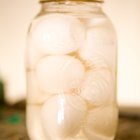
How to Make Brine Pickled Eggs
How to Preserve Salsa Made With Canned ...

How to Preserve a Hard Boiled Egg

Can I Make Pickled Eggs by Putting ...
How to Pickle Without Vinegar
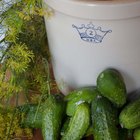
How to Pickle in Stone Crocks

Tayberry Jam Recipe

How to Store Apples

The Difference Between Pickles & ...
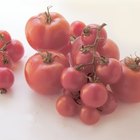
How to Freeze Stewed Tomatoes
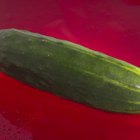
How to Convert Sour Pickles to Sweet ...
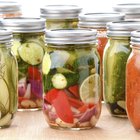
How to Can Green Tomatoes & Peppers ...
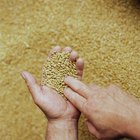
How to Ferment Grains
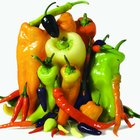
How to Pickle Peppers in Small Batches
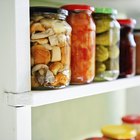
Are Pickled Vegetables Allowed on a Raw ...

How to Make Blueberry Jam

How to Process & Seal Hot Sauce Bottles
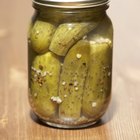
What Are the Seeds in Pickle Jars?
References
- Chicago Tribune: Homemade Pickles in About an Hour
- Colorado State University Extension: Making Pickles
- University of Wisconsin-Extension Cooperative Extension: Homemade Pickles & Relish
- Clemson Cooperative Extension: Describe Pasteurization.
- Food and Drug Administration: Science and Our Food Supply: Food Safety A to Z Reference Guide
- National Center for Home Food Preservation: Preparing and Canning Fermented and Pickled Foods Low-Temperature Pasteurization Treatment
Resources
Writer Bio
Susan Lundman began writing about her love of cooking, ingredient choices, menu planning and healthy eating after working for 20 years on children's issues at a nonprofit organization. She has written about food online professionally for ten years on numerous websites, and has provided family and friends with homemade recipes and stories about culinary adventures. Lundman received her M.A. from Stanford University.